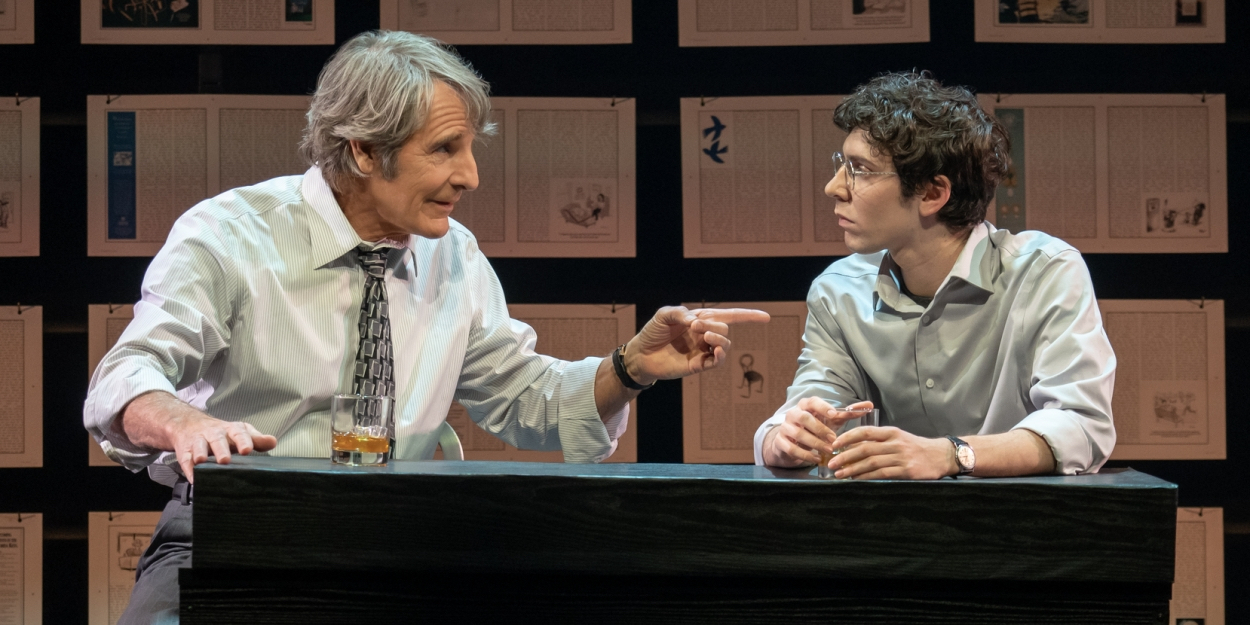THE CONNECTOR
Book by Jonathan Marc Sherman
Music and Lyrics by Jason Robert Brown
Direction and Concept by Daisy Prince
MCC Theater
Reviewed by David Spencer
I was a little surprised, after I saw the new musical The Connector, to note that it had received a fair amount of mixed-negative notices (I usually don’t look; I’m not sure I know why I did this time; maybe because I expected them to be enthusiastic).
On the one hand…I kind of get it. A fiction with roots in a true story (a number of true stories, actually, one in particular), it tells its story, set in the mid-late ‘90s, about Ethan Dobson (Ben Levi Ross), a young aspiring journalist who, via sheer force of will, gets some pieces he wrote in front of Conrad O’Brien (Scott Bakula), the second great editor-in-chief of the long-running magazine The Connector, reputed to be unafraid to tackle the truth behind the facts that have been massaged. O’Brien is reminded of his younger self and takes the kid under his wing. Not for the first time, O’Brien passes over the equally young and aspiring copyeditor Robin Marinez (Hannah Cruz; at the performance I saw, Marissa Medina), who is at first under Ethan’s spell too. Of course, as “at first” would suggest, the spell has its limits for her; and there are those on staff who are wary from the start—most consequentially fact checker Muriel no-last-name (Jessica Molaskey), who can’t flag outright errors as Ethan’s pieces collect and become more prominent, but becomes increasingly uncomfortable with the ambiguities for which her boss makes allowance after excuse after rationale.
There’s only one way for this story to go. And even to us in the audience, Ethan’s charm begins to evanesce fairly quickly. The complaint about The Connector‘s storytelling, in that wise, has mostly been that the narrative is superficial and doesn’t get to the core of what’s really going on.
Where I disagree with the negativity is: What’s to reveal?
The guy’s a fabulist. He’s makin’ stuff up. What’s to say about George Santos? There are people he fooled and people he didn’t fool. We know everything we need to know to grok the phenomenon. And nobody hides his or her reaction to Ethan. We know why they support him, why they don’t, why they stop.
As a musical dramatist, my history likewise includes an ethically shaky anti-hero, and I suppose one could argue that The Connector never gets to the core of Ethan. We know, obviously, that he wants the attention…but we don’t know what it fulfills for him. But I don’t think we’re supposed to. Or should.
We know exactly what drives Duddy Kravitz (my spin him, based in Mordecai Richler’s novel), but a curious thing about Duddy is that, except for one stark act, every line he crosses can be argued as an ambiguity. Even when bending the truth, he’s always exactly what he seems to be, in large measure because he has an endgame. And the story is about his pursuit of the endgame. About what kind of man he’ll choose to be as the endgame is within reach. We’re on his ride. It’s his story. We have to know him.
The Connector…isn’t Ethan’s story. It’s the story of the conditions that allow a disruptive force like Ethan to get past the gates and into the castle. And what happens within—and to—the castle when it does.
For a time, I think The Connector even means to fool us, and I’d tell you how, but I think, even knowing what I’ve just told you, that would constitute a spoiler. And that, too, is part of the musical’s mission. How better to show us how smart people can be fooled than to fool us too, even as our early-warning alert system is engaged. However—if we were to know Ethan’s endgame—not the game he wants to sustain, but his endgame, be it psychological or tangible—that which would fill the hole in him…then he couldn’t fool us. Then we couldn’t be in suspense about the line of demarcation. And then it would be telling another story.
As to the story it is telling, well, as I say, it can’t offer too much in the way of surprise, so Jonathan Mark Sherman’s libretto keeps the ball in the air with almost-relentlessly pithy dialogue and leitmotivic bits, such as increasingly more concerned letters to the editor from naïve yet observant Midwest reader Mona Bland (Mylinda Hull). And Jason Robert Brown’s score—rendered with his typical high musical and lyrical literacy—sticks assiduously to two purposes: the power of flash and dazzle; and the contrastingly unromantic hunger for truth. (Sidebar: Interestingly, for a fellow who can devise tight, intricate rhyme schemes, especially in the service of sophisticated themes, Mr. Brown mostly uses rhyme as occasional punctuation, just enough to keep the listener’s ear from getting lost in often verbose stanzas—long lyric lines with occasional discursions, in keeping with the talkiness of the periodical publishing storytelling universe. As if he’s avoiding dazzle except when he’s musicalizing dazzle; I’ll have to listen a second time.) All this is aided and abetted by a spectacular cast under direction by Daisy Prince that is among the most stylish and smart I’ve seen in a very long while.
The tricky nature of musicalizing this kind of story in this way is that while it can move you to excitement (the dazzle) and move you to root for justice (the truth)…it can’t really move you toward emotional catharsis. Narrative catharsis, yes.
But the ride you get on from that first “paragraph” is a roller coaster, not…
…well, not a carousel. If you know what I mean.
Like a good magazine feature, though, it fulfills the promise of the lead. Or should I type: lede. And that’s always the most crucial point of connection.
